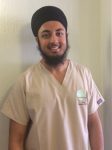This November, it’s Mouth Cancer Action Month.
The campaign aims to make a difference to people’s lives by raising awareness
of mouth cancer and encouraging conversations around the topic. Whether it’s
helping to prevent the disease, catching it early or providing support to those
who have undergone treatment, it’s pivotal that we all show our support to
those who need it most.
Risk factors
The two main causes of mouth cancer in the UK are drinking too much alcohol and
smoking. Smoking causes about 60% of mouth cancer cases and alcohol about 30%,
according to the Oral Health Foundation. Smoking and drinking together further
increase the risk of mouth cancer.
Many recent reports have linked mouth cancer to the human papillomavirus (HPV).
HPV is the major cause of cervical cancer and affects the skin that lines the moist areas of the body. HPV can be spread through oral sex. Research suggests that it could soon rival smoking and drinking as one of the main causes of mouth cancer.
Practicing safe sex and limiting the number of partners you have may help reduce your chances of contracting HPV.
There are now HPV vaccines for both girls and boys. They were developed to fight cervical cancer, but it is likely that they will also help to reduce the rates of mouth cancer. These vaccines are given at age 12 to 13.
Other risks factors include too much sun exposure to the lips, a weak immune
system and poor oral health.
A poor diet, low in fruit and vegetables might increase risk, as it is likely to be lower in minerals and vitamins. Poor diet is linked to around one third of mouth cancer cases.
Spotting it
According to the Mouth Cancer Foundation, over 8,800 people are diagnosed with
mouth cancer annually in the UK. Over 3,000 lives are lost due to mouth cancer
each year in the UK. While mouth cancer is twice as common in men than women,
more women are being diagnosed.
Knowledge about mouth cancer has improved over the years, but many cases are
still not being caught early enough. Its prevalence has increased by 49% over
the past decade.
Checking for mouth cancer can be done at home, taking no more than a minute. To
check for anything unusual, such as lumps, bumps, red/white patches, and ulcers
that have been there for over three weeks, the Oral Health
Foundation recommends:
- Feeling your face, head, and neck
- Checking your tongue – both sides and underneath
- Feeling the insides of your cheeks with your fingers
- Tilting your head back to look at the roof of your mouth in the mirror
- Checking your lips – top and bottom, inside and out
Your dentist and dental hygienist can also spot the
early signs of mouth cancer during a routine dental health check. This is
another important reason to attend frequent dental appointments.
Maintaining a thorough oral hygiene routine is may help to reduce the risk of
developing the disease. This routine includes brushing twice daily with a
fluoride toothpaste and cleaning between the teeth at least once a day.
The effects on oral health
The effects of mouth cancer on oral health can be severe. Post-treatment,
issues with breathing, drinking/eating, speaking, and swallowing might be
encountered. When surgery is necessary, there may also be facial disfigurement.
The mental, emotional, and physical aftermath of treatment for mouth cancer can
be profound. A strong, interdisciplinary support system is crucial for
rehabilitation. Dental professionals, clinicians and counsellors, play an
important role in improving the quality of life during and after diagnosis.
Supporting those who need it most
Coming to terms with a diagnosis of mouth cancer can be challenging, even
debilitating. The importance of catching the disease early, and recognising the
warning signs, cannot be understated. Whether it’s through educating loved
ones, taking part in sponsored activities and/or fundraising, action is pivotal
in the battle against mouth cancer.
We are here for you at any stage of your journey, and to help you catch the
early warning signs. We’re here for you at Identity Dental Care and very happy
to answer questions you may have about mouth cancer, so please get in touch if
you’d like to know more. Call us on 01642 554299.








